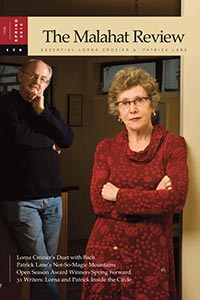Issues
Our Back Pages
Issue #170
Issue Date: Spring 2010
Editor: John Barton
Pages: 144
Number of contributors: 34
Buy Issue 170: Print Edition

The subtitle of issue 170 is “Lorna Crozier, Patrick Lane, and Aesthetic Kinship” and this volume is a festschrift for the pair of literary icons and their influence—together and separately—on a generation or two of Canadian writers and readers.
Life-partners since the late 1970s, Lane and Crozier have maintained separate careers in their own directions and in their own ways, and yet are bound, not only by their commitment to each other and to writing, but to what editor John Barton describes as their “luminous” circle of literary friends as well.
This tribute issue takes an interesting approach. There are poems and stories that directly honour the pair’s importance to other writers, as well as pieces that speak laterally to issues of style and sensibility that come from that circle of influence that has Crozier and Lane as its centre. Barton calls it a “scrapbook collaging poems, stories, and recollections that writers, in a humble state of anxiety and trust, share.”
A poem by Jan Zwicky called “Gemini” begins, “There is a life / in which I do not find you.” It refers to the importance of the other in the recognition that “your life / had curled and trellised on / some absent shape of emptiness / that had shaped you” and so speaks with a dazzling image to the way that we bend around an other, often without being aware of the way that we are changing shape. Although I don’t think Don Domanski in his poem, “For the Pure Mother Bee,” is aware of the reference, there is in that piece a prayer that speaks magically to Zwicky’s poem: “Gemini, don’t let this year’s abundance of possibilities / be tomorrow’s lost dreams.”
Seán Virgo’s story, “Rendezvous,” is about “a man who came home from the war and did not find peace” and echoes the dark tone of much of Lane’s fiction. Virgo is one of Canada’s under-appreciated writers. He has been writing and editing for years and is an inventive and even daring writer, but the spotlight has not lingered on him as long as he deserves. This story changes pace halfway through. Virgo adopts second-person narration and “the man” who has been described from a distance, becomes intimately familiar. “Don’t follow me,” he says, as if warning the reader from continuing down the path.
Tim Lilburn’s “A Song of Clarity,” with its “Whiskery mouth pouches of Queen Anne’s lace on the peninsula,” may be referring to Patrick and Lorna’s garden, as might Melanie Siebert’s “rough fescue, foxtail, / slough grass, dropseed, little bluestem” which “go to seed and sew our bodies to the ground.”
The issue is thick with stories and poems that seem fueled by the passion for writing that Lane and Crozier cultivate. There are poems by Jane Munro, George Bowering, Robyn Rowland, Steven Price, Don McKay, Brian Brett, and Isabel Huggan, stories and reminiscences by Jeanette Lynes, Elizabeth Philips, Donna Kane, and John Kinsella, and there are contributions from Stephen Reid and Susan Musgrave, who may have known Patrick Lane and Lorna Crozier better than anyone.
I was lucky to conduct the interview for this issue, surprised by the candour of both Patrick and Lorna. I’ve been on the edges of that luminous circle for a long time and yet they didn’t hesitate at all to let me right in. We had a long and frank conversation, during which I was particularly moved by their humility. Despite their status as icons of Canadian letters, they both have their share of doubt, and are deeply dedicated to the way they’ve given their lives to writing.
Finally, the beating heart of the issue is a healthy selection of work from Crozier and Lane themselves: a selection of Crozier’s poems generously distributed throughout and a fiction excerpt from Lane show us why these two have made so many readers and writers sit up and pay attention.
— Jay Ruzesky









